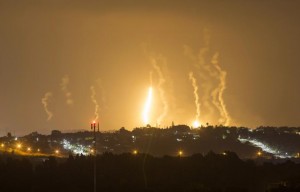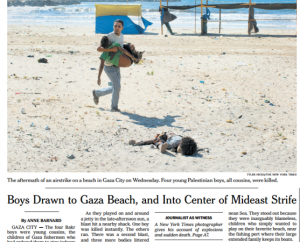Podcast: Play in new window | Download
Updates:
- Palestine Center For Human Rights: Current War Statistics On Palestinian Death Toll
- Two Laws Under Geneva Conventions: First All Attacks Have To Distinguish Between Military Objectives and Civilian Objectives. Second: You Can’t Just Kill Civilians Who Aren’t Participating in A War
- Michael Smith: Cultural Ethnicide – Keep Expanding Until Israel Takes Over
- Cultural Genocide Case: Illan Pappe – Ethnic Cleansing Of Palestine
- Naomi Wolf Walks Out of Synagogue When Nothing Is Said About Gaza
- Demonstrations Against The Murder and Violence Against Palestinians
- Michael Ratner Admonishes JFRED Jews For Racial and Economic Justice and Other GroupsTo Step Forward
- Michael Ratner Pulls Apart NY Times Article: Crises Cascade and Converge, Testing Obama
——-
Michael Ratner Discusses 3 International Crimes That Can Be Attributed To Israel’s Actions Against Palestinians: Genocide, Apartheid and Crimes Against Humanity.
- First International Crime: Genocide – There are two elements, one is the mental element, what you’re thinking, and the mental element is intent to destroy in whole or in part. Then it defines who you want to destroy. A national group which would be the Palestinians. An ethnical group, which has a common cultural heritage, racial or religious group. Second is physical, it includes killing members of the group, serious body or mental harm to members of the group. Inflicting on the group conditions of life calculated to bring about its physical destruction in whole or in part.
- A key term when I say in whole or in part is important.
- It says the perpetrators, the Israelis in this case need not intend to destroy the entire group.
Destruction of only part of a group, members living in one region is also genocide. They tried to get rid of all the educated people. They tried to get rid of the leaders. It pretty clearly fits the legal definition. So we have the crime of genocide and genocide of course can be prosecuted in the International Court of Justice.
That can be prosecuted by states who have their own universal jurisdiction.
If an Israeli general or politician travels to a country that will actually enforce its genocide laws that person can be prosecuted under the Genocide Convention and the laws that flow from it. - Second International Crime: Apartheid – It’s defined as inhuman acts committed for the purpose of establishing and maintaining domination by one racial group of persons over any other racial group of persons and systematically oppressing them.
- Third International Crime: Crimes Against Humanity – It includes any of the following acts committed as part of a widespread or systematic attack directed against any civilian population. They include, murder, deportation or forcible transfer of population, imprisonment, enforced disappearance of persons, the crime of apartheid other inhumane acts of a similar character intentionally causing great suffering or serious bodily or mental injury.
Law and Disorder Co-host Attorney Michael Ratner, President Emeritus of the Center for Constitutional Rights (CCR), a non-profit human rights litigation organization based in New York City and president of the European Center for Constitutional and Human Rights (ECCHR) based in Berlin. Ratner and CCR are currently the attorneys in the United States for publishers Julian Assange and Wikileaks. He was co-counsel in representing the Guantanamo Bay detainees in the United States Supreme Court, where, in June 2004, the court decided his clients have the right to test the legality of their detentions in court. Ratner is also a past president of the National Lawyers Guild and the author of numerous books and articles, including the books Who Killed Che? How the CIA Got Away With Murder, The Trial of Donald Rumsfeld: A Prosecution by Book, Against War with Iraq and Guantanamo: What the World Should Know, as well as a textbook on international human rights.
——-
Western Media Coverage of Israel Gaza Violence
Last week we interviewed Phil Weiss of Mondoweiss and talked about the media’s role in reporting facts and detailing the history around the escalating violence against Palestinians by the Israeli military. Specifically in the discussion, Phil believed that what he considered better media analysis of the Middle East situation and some other factors, might prevent a ground assault against Gaza. Michael Ratner and Michael Smith both disagreed with Phil believing that it wasn’t just about media coverage or a little better media coverage but the question of a ground assault went to a much deeper issue. 3 hours later unfortunately Michael Smith and Michael Ratner were proven correct.
- I think the first thing you have to say of this issue is that the loss of human life has been overwhelmingly on one side.
- I think that needs to be clear in the coverage.
- What you’re getting is a coverage on the whole attempts to that treats both sides evenly as if the trauma is equally split between the two sides.
- The latest figure is 161 children killed in Gaza.
- And to treat the worries of Israelis as important or more important than the death of 161 kids I think is revolting.
- There was a poll a while back showing that when people heard the word “occupied territories” a lot of people think that the Palestinians are occupying Israeli territory because the media so rarely explain what’s going on.
- They’re not explaining what the situation is between Gaza and Israel and so you get coverage of the rockets as if they are the main problem.
- It’s really a cockeyed way of viewing the situation I think.
- We were talking about the headline that was changed in the New York Times after the beach massacre when Israel bombed kids playing soccer on the beach and killed 4 boys.
- The original headline was “Four Young Boys Killed Playing On Gaza Beach” which I might note leaves out the active subject of that sentence it doesn’t say who killed them.
- By the time it made it to print, the headline had been changed to “Boys Drawn To Gaza Beach And Into Center of Mideast Strife.”
- You see the underlying bias in these examples.
- Another is 13 Israeli soldiers, 70 others killed. A lot of readers are going to read that and when you say 13 soldiers and 70 others, you’re going to read that as 70 other Israelis who weren’t soldiers were killed.
- On MSNBC there was a contributor, a Palestinian American, Rula Jebreal, who was discussing this case and the coverage in general of MSNBC, and was critical of the amount of air time given to Israeli officials versus the amount of time given to Palestinians to discuss the conflict.
- After making these criticisms, within hours, she had her contract canceled by MSNBC.
- She was actually brought back on not as an MSNBC contributor but as a Palestinian journalist to talk to Chris Hayes, and Chris Hayes defended her firing.
- In this particular conflict 100 U.S. Senators voted to declare their support for Israel with no mention of the Palestinians who are dying.
- Michael Smith: 100 to zero. What does that say about democracy?
- I think its safe to say there’s more dissent in U.S. media than in U.S. government about the attack on Gaza.
- I think that the rise of social media has effected the coverage.
- When you’re doing a story about people treating war as a spectator sport and don’t mention that people are dying in the war, you are really treating war as a spectator sport.
- We’re writing about this daily on our blog FAIR.org. You can also hear us talking about these issues on Counterspin.
Guest – Jim Naurekas, Extra! Magazine Editor Since 1990, Jim Naureckas has been the editor of Extra!, FAIR’s monthly journal of media criticism. He is the co-author of The Way Things Aren’t: Rush Limbaugh’s Reign of Error, and co-editor of The FAIR Reader: An Extra! Review of Press and Politics in the ’90s. He is also the co-manager of FAIR’s website. He has worked as an investigative reporter for the newspaper In These Times, where he covered the Iran-Contra scandal, and was managing editor of the Washington Report on the Hemisphere, a newsletter on Latin America. Jim was born in Libertyville, Illinois, in 1964, and graduated from Stanford University in 1985 with a bachelor’s degree in political science. Since 1997 he has been married to Janine Jackson, FAIR’s program director.
————————————————————



